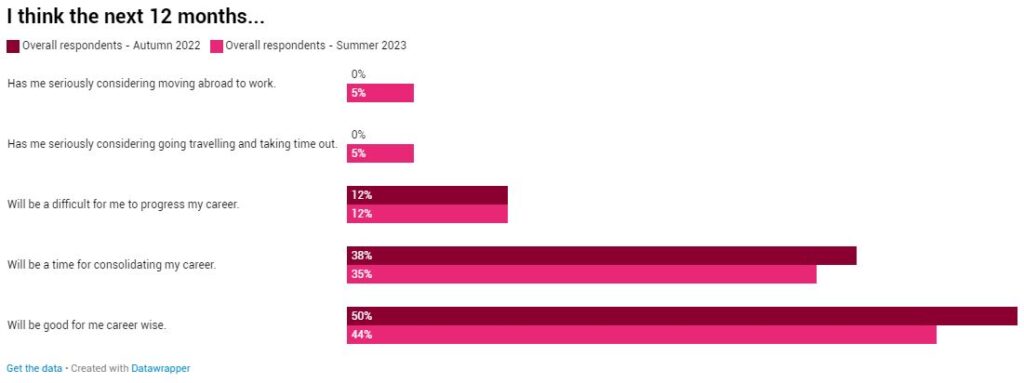Employment survey – Part 2 – Pay, perks and the state of the employment market

In the second out of three articles on The Currency, our Managing Partner Paul McArdle looks at the jobseekers attitudes to the current employment market.
The Panel ran our Summer Candidate Sentiment Survey in May 2023. The survey was sent to candidates across the accountancy, financial services, HR, banking, treasury, funds, IT, and legal professions.
In our most comprehensive survey to date, we got a total of 3,025 people responding.
As well as answering single-choice and multiple-choice questions, we gave respondents a free text option to comment as they saw fit. The quotes in this article are from the candidates themselves.
This is the second article of three in The Currency and concentrates on the respondents’ attitudes to the current employment market. Part one focused on working from home and the future of the office.
*****

This is a new survey question. We were keen to find out if the technology layoffs have coloured people’s perceptions of the power balance between employees and employers.
Just over one in four respondents believe it is an employer’s market, with 41 per cent believing it is an employee market, and a sizable number of respondents, 31 per cent, feeling it is neither one nor the other.
What the respondents said:
“Companies in Ireland need to start considering working parents, not just working mothers.”
“Since post-pandemic, my work and teamwork a lot more hours, there is no control, and you are expected to be online.”
“Pay is not in line with inflation and the cost of living.”
“In relation to the balance of power question, last year, I would have said it was in the employee’s hands, but with recent redundancies and the cost of living crisis, I feel employees are afraid to move, so the balance of power has shifted to the employer.”
“Senior lawyers are finding it difficult to get new suitable jobs.”
“The work environment has changed a lot during the pandemic and after. I feel the actual balance between what employees need and what employers want will continue to evolve until an equilibrium is met.”
“Although good candidates are hard to find, I’ve seen bad behaviour from both sides, employers ghosting candidates and candidates not turning up or canceling interviews at the last minute. It’s a difficult time to be in the market.”
“There is opportunity out there, but my most pressing concern is the number of major firms putting a temporary hiring freeze in place.”
Comparison – The IT candidates on their take on the balance of power
We separated out the answers of our IT candidates who took the survey to compare them against the main survey findings. How did the people most affected by the cull in staffing in IT differ?
They feel that the balance of power is more with the employer, but not as much as we expected (28 per cent – overall survey) versus 31 per cent (IT respondents only). Overall, we believe this is explained by the fact that the IT job cuts were mainly in the sales and talent acquisition areas, not traditional IT roles.

What the respondents said:
“I’m 54 years old this year. I’m starting to realise the ‘limitations’ that age seemingly places (biasedly) on my career in the sector I’m in. (I’m a mid-level IT Operations Manager with over 25yrs experience in the industry).”
“I’m in the process of shifting my career focus completely – I have different values and goals now. Organisations, it is clear, exist for the benefit of the organisations, and people are not the priority. This no longer works for me.”

We added two more elements to this question in the Summer Survey – regarding taking time out (at 5 per cent), or considering moving abroad to work, also at 5 per cent.
In The Panel, we see a lot of newly qualified accountants and solicitors leaving en masse for Australia or Canada to work and travel. It is not just newly qualified professionals emigrating, professionals with up to three years post-qualification experience are also going, as this option was not open to them during Covid.
Otherwise, where half the respondents felt that 2023 would be good for them career-wise in the Autumn Survey, that figure has dropped to 44 per cent in our latest survey (a significant drop of 20 per cent overall).
The figure of 12 per cent is consistent across both surveys for those respondents who believe this year will be difficult for them career-wise. There is no significant shift in sentiment for those who see this year as one for consolidating their career, with 38 per cent (Autumn Survey) to 35per cent (Summer Survey), respectively.
What the respondents said:
“Appears to be a covid hangover out there. Staff quit roles without having another job.”
“Hoping to change job despite employer market.”

This is positive to see. Just 8 per cent of the respondents are in a pessimistic mood about their careers, while over four in ten respondents are optimistic about their careers this year, and just under half with a balanced viewpoint.
What the respondents said:
“Optimistic – more of a feeling marker on current mood, future expectations and future systems, work and AI.”
“Pessimistic – working longer than ever hours, mainly from home.”
“Optimistic – I work in the ESG space, particularly on Commercial Building Energy Savings, and it is a very busy and growing space.”
“Balanced – I think a lot of things are in a state of flux. The next 12 months will be important.”
Other comments of note:
“Ageism and unconscious bias would be interesting metrics.”
“Too much positive discrimination in the job market to achieve gender balance. Let’s discriminate against new entrants (that seems to be OK and acceptable to all the usual “faces”) – and nobody is raising it as a problem – or speaking up for the discriminated. Discriminating now to sort out past problems is not the solution.”
“Ireland has the worst transport system in the OECD, this, combined with a housing crisis, means that mature employment practices need to allow for extremely high degrees of flexibility. Commuting in this country is a chaotic experience; unless necessary, employees should be granted as much flexibility as possible. Failure to do so is to miss an opportunity for an organisation to evolve and to reward traditional command and control systems of management – companies that fail to understand this will be overtaken by more sophisticated organisational structures that place a high value on trust and can rely on a modern breed of sophisticated self-starting, self-managing, employee, to get the job done.”
*****
We would like to thank all the respondents for filling out the survey. Special thanks to those who chose to add their comments; these were particularly illuminating.
This article was initially published on The Currency website.